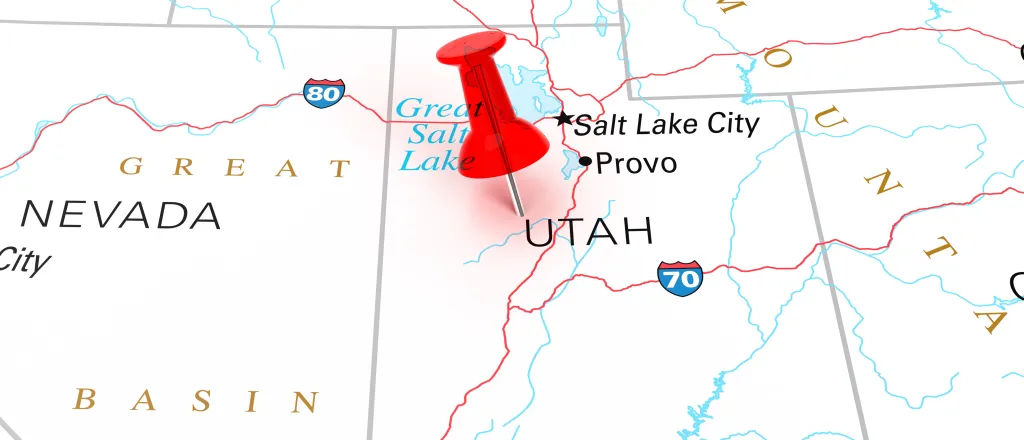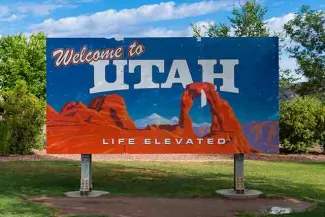
Massive crowd descends on Utah Capitol calling for governor to veto union bill
Nearly 1,000 teachers, firefighters and other union advocates crammed inside the Utah Capitol rotunda Friday, calling on Governor Spencer Cox to veto a controversial bill that strips the state’s public unions of their ability to collectively bargain.
HB267 passed the Utah Senate Thursday after a narrow 16-13 vote, with seven Republicans joining six Democrats to vote “no.” It now heads to the governor’s desk.
“He has always said he’s a pro-public education governor,” Utah Education Association President Renee Pinkney said of Cox. “Now it’s time to prove that it’s not just words, but it’s an action he can take, to veto HB267. Utah is watching and we need that bill vetoed.”

Utah Governor Spencer Cox
The bill prevents public unions from engaging in collective bargaining, the process where unions meet with employers — in this case, a school district, city, county, or other government entity — and negotiate a contract for terms of employment.
Lawmakers say it protects public funds by ensuring public unions can’t negotiate terms of employment that go against the best interests of taxpayers, while giving all employees a greater voice. If a teachers union, for example, only represents one third of the employees in a school district, it shouldn’t be able to negotiate employment contracts on behalf of everyone, lawmakers said.
It’s unclear what Cox will do with the bill. His office on Thursday told Utah News Dispatch that he’s been following the debate, but didn’t say if he plans on signing it.
Calls for a veto rang loud at the Capitol Friday afternoon, echoing through all five floors of the building, spilling into the House and Senate chambers, and at times, shaking the floor.
At about 3:30 p.m. Friday, teachers wearing red and carrying signs reading “Veto HB267” headed into the building. By 4:00 p.m., the crowd poured down the marble steps of the rotunda, growing to about 1,000 people. Lawmakers who had opposed the bill joined chants of “solidarity forever, the union makes us strong!” while others watched from the balconies overlooking the rotunda.
The crowd was so large Pinkney couldn’t deliver her planned remarks over the noise.
“You can see they came out today, our members, other public sector unions,” she told Utah News Dispatch. “It just helps us so much to feel like we have the support of not only parents, but also the public.”
It’s the latest in what’s been a process mired in controversy — teachers, firefighters, police officers, county and municipal workers, and private sector union members overwhelmed lawmakers this session with calls, texts and emails opposing the bill. As the bill moved through the legislature, hundreds of union advocates gathered in protest, speaking in committee meetings and crowding outside of the Senate chambers while lawmakers voted.

© iStock - gnagel
Lawmakers say much of the opposition was rooted in a miscommunication as to what the bill actually does. Just Salt Lake City’s fire and police departments, along with a handful of school districts, have unions that engage in collective bargaining. The sponsors, Representative Jordan Teuscher, R-South Jordan, and Senator Kirk Cullimore, R-Sandy, both reiterated that the bill “does not dissolve unions.”
“I stand by the policy,” Cullimore said Friday, before the protest. “I’m hopeful that the rank and file union members will get the message about what the bill actually is and what it actually does, and at least know what they’re protesting.”
When asked about Cullimore’s comments a few hours later, Pinkney responded, “We know what the bill does.”
“Across the public sector labor unions, we have had attorneys who have broken the bill down,” she said.
Now, if their ability to negotiate is eliminated, unions fear that employers will feel empowered to disregard concerns. Even unions that didn’t engage in collective bargaining still had the option, which gave them leverage, she said.
“This is one of the challenges that we might be facing,” said Pinkney. “Our educators might start to see stagnant wages.”
The bill took a convoluted path through the legislature, narrowly passing both House and Senate committees, and seeing broad bipartisan opposition. When it reached the Senate, Cullimore said he and Teuscher were working on a compromise so that unions, and some of the more skeptical lawmakers, would get on board — but rather than vote on an amended version of the bill, senators still voted for the original version.
The following day, an amendment was released that would still allow for collective bargaining, but was never actually adopted. And in the days that followed, lawmakers say the opposition continued to pour in. A compromise “never materialized,” Cullimore said, and instead of pushing for the amended version, he called for a vote on the original.
“We feel incredibly betrayed by the legislative process,” Pinkney said. “We had gone through the negotiation process to try and get a new version of the bill, and for them to go back to the first (version) was just incredibly disappointing.”
Now, Pinkney and thousands of Utah teachers, firefighters, police officers and other public employees are looking to Cox to veto the bill, a power that he doesn’t often wield. He denied seven bills that he called “unnecessary” in 2024, while letting two go into law without his signature. And in 2023, he didn’t issue a single veto.
“Governor Cox, the people say, veto this bill and don’t delay!” the crowd chanted Friday.
Utah News Dispatch is part of States Newsroom, a nonprofit news network supported by grants and a coalition of donors as a 501c(3) public charity. Utah News Dispatch maintains editorial independence. Contact Editor McKenzie Romero for questions: info@utahnewsdispatch.com.

















